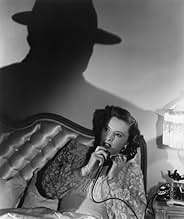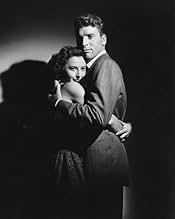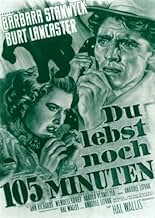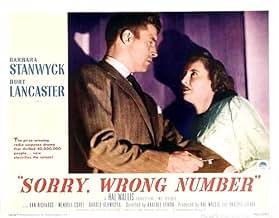IMDb-BEWERTUNG
7,3/10
13.519
IHRE BEWERTUNG
Eine kranke Frau belauscht am Telefon ein vermeintliches Mordkomplott und versucht, es zu verhindern.Eine kranke Frau belauscht am Telefon ein vermeintliches Mordkomplott und versucht, es zu verhindern.Eine kranke Frau belauscht am Telefon ein vermeintliches Mordkomplott und versucht, es zu verhindern.
- Für 1 Oscar nominiert
- 3 Gewinne & 3 Nominierungen insgesamt
Bill Cartledge
- Page Boy
- (Nicht genannt)
Cliff Clark
- Police Sergeant Duffy
- (Nicht genannt)
Joyce Compton
- Cotterell's Blonde Girlfriend
- (Nicht genannt)
Ashley Cowan
- Clam Digger
- (Nicht genannt)
Yola d'Avril
- French Maid
- (Nicht genannt)
Suzanne Dalbert
- Cigarette Girl
- (Nicht genannt)
Empfohlene Bewertungen
Heck of a thriller, though the narrative is difficult to piece together at times. Stanwyck gets to run through a gamut of hysterical emotions as the intended victim. Her Leona is not particularly likable as the rich man's daughter who gets her way by bullying people around her. So there's some rough justice in her predicament—alone, disabled and dependent on the phone while a killer seemingly stalks her. Even the independent working-man, a studly Henry (Lancaster), is bullied into taking up with her. Of course, it doesn't hurt that she's got scads of money to assist her schemes. Incidentally, catch how Henry's several capitulations to others (Leona, Morano) are marked by allowing them to light his cigarette. Nice touch.
The idea of only gradually revealing why Leona is being set up for murder is a good one. It adds to the suspense—not just a 'when' but also a 'why'. The trouble is the disclosure is only revealed in pieces over the phone using flashbacks, and these are hard to piece together over a stretch of time. But enough comes through that we get the idea. There's some great noir photography from Sol Polito that really adds to the tense atmosphere. Anyhow, it's a great premise that also played well over the radio that I recall as a kid. It's also a subtle irony that one could end up being so alone in the middle of a great city. Poor Leona, maybe if she had been a little nicer and less bossy over the phone, she might have made the human connection she needed.
The idea of only gradually revealing why Leona is being set up for murder is a good one. It adds to the suspense—not just a 'when' but also a 'why'. The trouble is the disclosure is only revealed in pieces over the phone using flashbacks, and these are hard to piece together over a stretch of time. But enough comes through that we get the idea. There's some great noir photography from Sol Polito that really adds to the tense atmosphere. Anyhow, it's a great premise that also played well over the radio that I recall as a kid. It's also a subtle irony that one could end up being so alone in the middle of a great city. Poor Leona, maybe if she had been a little nicer and less bossy over the phone, she might have made the human connection she needed.
Sorry, but 'Sorry, Wrong Number' loses a lot in its transition to the screen. For one thing, there are too many flabby flashbacks--a form quite popular in the '40s but used extensively in this film, ad nauseum. All of the suspenseful action in the bedroom of the bedridden victim is held at bay while we watch another endless flashback attempting to show us how selfish and unworthy this woman is. If you heard the original radio drama with Agnes Moorehead giving a spine-chilling portrait of Leona, you'll see why the film becomes too diffuse in an attempt to give us "filler material". The fact that Lucille Fletcher adapted her own work for the screen would give the viewer hope that this is going to be just as good as the radio drama--but it's not. Barbara Stanwyck gives an excellent performance, bordering on hysteria toward the finale--but it's an actressy performance and not as controlled as some of her other film noir roles. Burt Lancaster has a colorless role and can't do much with it. Ann Richards is impressive as the woman who tries to warn Leona. By expanding the plot outside the bedroom, Fletcher created a confusing number of sub-plots that simply take away from the tension. Too much padding actually hurts the film. Anatole Litvak's direction is strong--but not strong enough to put the film on the same level with the classic radio drama. The plot is overcomplicated to the nth degree.
Trivia note: The only other film with such heavy use of flashbacks to tell a complicated story is THE LOCKET ('47), but it was done more efficiently than it is here.
Trivia note: The only other film with such heavy use of flashbacks to tell a complicated story is THE LOCKET ('47), but it was done more efficiently than it is here.
Barbara Stanwyck (as Leona Stevenson) is a neurotic woman, confined to her bed. She is married to the very attractive, and mysterious, young Burt Lancaster (as Henry Stevenson). Ms. Stanwyck relies on a state-of-the-art 1940s corded telephone to help communicate her needs. One evening, she picks up her phone and overhears two men plotting a murder; eventually, the crime moves too close to Stanwyck for comfort
Stanwyck is excellent as the spoiled, arrogant, and wealthy, but, ultimately, helpless heroine of Lucille Fletcher's adapted radio play (the part was originated on radio by Agnes Moorehead). The story picks up some flaws in its extension into a feature film; it is most frustrating as (flashbacks) ((within flashbacks)) (((within flashbacks))) occur; and, the story becomes a little confusing. Still, Stanwyck's fine performance carries the film to an exciting, tense, conclusion.
******** Sorry, Wrong Number (9/1/48) Anatole Litvak ~ Barbara Stanwyck, Burt Lancaster, Wendell Corey
Stanwyck is excellent as the spoiled, arrogant, and wealthy, but, ultimately, helpless heroine of Lucille Fletcher's adapted radio play (the part was originated on radio by Agnes Moorehead). The story picks up some flaws in its extension into a feature film; it is most frustrating as (flashbacks) ((within flashbacks)) (((within flashbacks))) occur; and, the story becomes a little confusing. Still, Stanwyck's fine performance carries the film to an exciting, tense, conclusion.
******** Sorry, Wrong Number (9/1/48) Anatole Litvak ~ Barbara Stanwyck, Burt Lancaster, Wendell Corey
In New York, the spoiled Leona Stevenson (Barbara Stanswick) is the invalid wife of the VP of a pharmaceutical industry Henry J. Stevenson (Burt Lancaster)and becomes aware of a murder that would be committed late night of that day through a "cross-wire", when she overhears two men planning the murder.
Leona tries to find the right number to tell the police and she discovers that her former friend and ex-girlfriend of Henry, Sally Hunt Lord (Ann Richards), had lunch with him. She recalls the first encounter with her husband and parts of her life with him through flashbacks. Along the night, she learns dirty secrets about Henry and she finds that she might be the intended victim.
"Sorry, Wrong Number" is a great film-noir with a suspenseful story and top-notch performances. The screenplay and the direction are excellent and keep the attention of the viewer until the end of the last scene. This movie deserves to be watched more than once and is highly indicated for fans of film noir. My vote is nine.
Title (Brazil): "A Vida Por Um Fio - O Clássico" ("The Life for One Line - The Classic")
Note: On 29 September 2013, I saw this movie again.
Leona tries to find the right number to tell the police and she discovers that her former friend and ex-girlfriend of Henry, Sally Hunt Lord (Ann Richards), had lunch with him. She recalls the first encounter with her husband and parts of her life with him through flashbacks. Along the night, she learns dirty secrets about Henry and she finds that she might be the intended victim.
"Sorry, Wrong Number" is a great film-noir with a suspenseful story and top-notch performances. The screenplay and the direction are excellent and keep the attention of the viewer until the end of the last scene. This movie deserves to be watched more than once and is highly indicated for fans of film noir. My vote is nine.
Title (Brazil): "A Vida Por Um Fio - O Clássico" ("The Life for One Line - The Classic")
Note: On 29 September 2013, I saw this movie again.
A woman confined to a bed overhears a murder plot on a crossed telephone line and tries to alert the police. The plot structure is quite convoluted, with most of the story told in flashbacks. In fact there are flashbacks within flashbacks, making it somewhat hard to follow. The audience is supposed to feel sympathy for Stanwyck, but the character is too self-centered and whiny for that to happen. Given her character's propensity for histrionics, the actress manages to keep her performance somewhat controlled; Lancaster is fine as her trophy husband. Litvak creates a good film noir atmosphere, although at times his camera roams aimlessly, becoming a distraction.
Wusstest du schon
- WissenswertesAnatole Litvak: When Henry is having lunch with Sally, he asks the waiter if he knows who the gentleman is in the dark glasses at the table behind him. It's the director of the film.
- PatzerTwice, Leona turns on a radio, and music begins instantly and strongly. Radios of the film's era contained vacuum tubes that needed some time to warm up.
However, this would be filmmaker's prerogative, not wanting to slow the pace of the film with extended silence.
- Zitate
Henry Stevenson: [to Leona] I want you to do something. I want you to get yourself out of the bed, and get over to the window and scream as loud as you can. Otherwise you only have another three minutes to live.
- Crazy CreditsPROLOGUE: "In the tangled networks of a great city, the telephone is the unseen link between a million lives...It is the servant of our common needs-the confidante of our inmost secrets...life and happiness wait upon its ring...and horror...and loneliness...and...death!!!"
- VerbindungenEdited into Tote tragen keine Karos (1982)
Top-Auswahl
Melde dich zum Bewerten an und greife auf die Watchlist für personalisierte Empfehlungen zu.
- How long is Sorry, Wrong Number?Powered by Alexa
Details
- Erscheinungsdatum
- Herkunftsland
- Sprache
- Auch bekannt als
- Al filo de la noche
- Drehorte
- Hollywood, Kalifornien, USA(telephone switchboard at a telephone company office on Gower St.)
- Produktionsfirma
- Weitere beteiligte Unternehmen bei IMDbPro anzeigen
Box Office
- Weltweiter Bruttoertrag
- 1.974 $
- Laufzeit
- 1 Std. 29 Min.(89 min)
- Farbe
- Seitenverhältnis
- 1.37 : 1
Zu dieser Seite beitragen
Bearbeitung vorschlagen oder fehlenden Inhalt hinzufügen




































